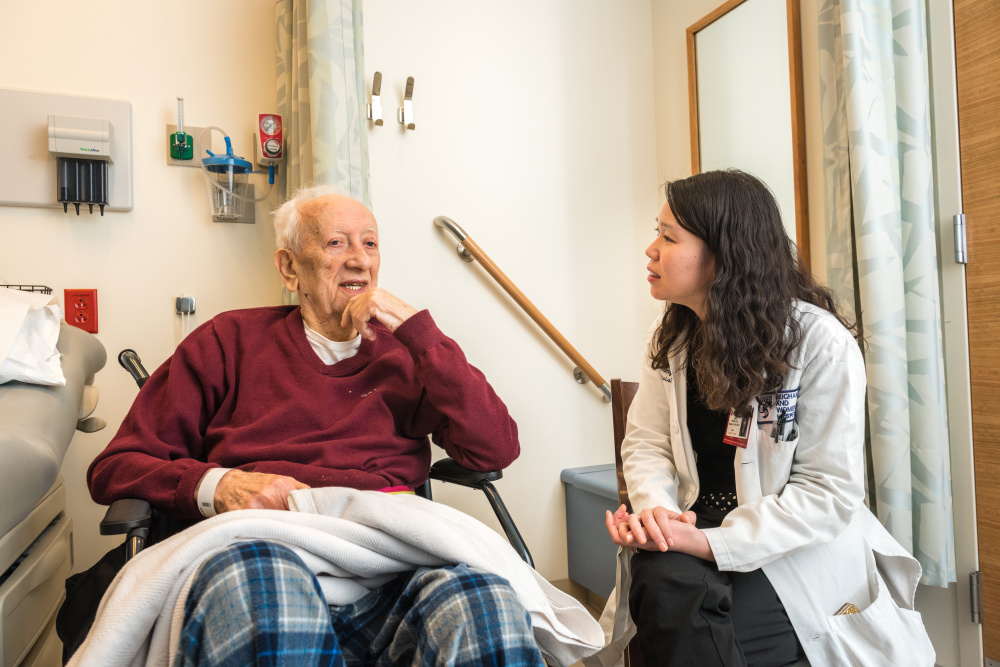Geriatrician Tammy Hshieh, MD, MPH, introduces herself to patients by saying she is a specialist in aging and complexity. Almost inevitably, a cancer patient in his or her 70s, 80s, or 90s is dealing with more than a tumor – and that’s where Hshieh’s skills and experience can be an asset to the treating oncologist.
“In addition to having cancer, an older patient may have hypertension, history of heart attack or stroke, or some dementia, and that changes the playing field for how we treat their cancer,” says Hshieh, a team member in the Older Adult Hematologic Malignancy (OHM) Program of Dana-Farber/Brigham and Women’s Cancer Center. This program offers older patients – generally 75 years and above – the best cancer care available while also taking into account other illnesses or concerns specific to this growing population.
Most of Hshieh’s patients are in their 80s and some are in their 90s, with leukemia, lymphoma, or multiple myeloma. This population is on the rise for several reasons. Cancer patients are surviving longer and are more informed and vocal advocates for their health, Hshieh explains, and “we now have treatment regimens that are more acceptable for older patients,” she says.
Still, older patients need special management because they may be frail and subject to more severe treatment reactions. “A 30-year-old may get a high dose of chemotherapy and have nausea and peripheral neuropathy,” explains Hshieh. “But for an older patient, their nausea can lead to dehydration and their neuropathy can cause falls and hip fractures.”
She typically meets with a patient at or near the beginning of treatment, conducting a comprehensive geriatric assessment in a one-hour appointment. Hshieh reviews their medications and other medical conditions, and asks about psychosocial and emotional support from family and friends. “This assessment allows us to understand these patients and highlight their vulnerabilities,” she says. “We can help the oncologist understand how frail or deconditioned they are, which can affect decisions about a high dose of chemotherapy, or a lower dose, or a more palliative regimen.”
Cancer patients are surviving longer and are more informed and vocal advocates for their health.
While it may not be strictly true that age is just a number, Hshieh says there is great variability in people older than 65. “Someone might be skiing at age 90 while a person who’s 75 might be virtually housebound.”
After the initial assessment, Hshieh follows up with the patient, sometimes weekly, but at least every three months. Her role as a geriatrician is inherently multidisciplinary, she says, and she often will communicate with the patient’s primary care doctor or disease specialists.
She notes that “we’re seeing a higher number of people with some memory difficulties – more than we had realized.” That is a signal that physicians need to be explicit when counseling and educating these patients — giving clear instructions, often in writing, about taking medications or when to call their doctors. “We often have to offer more support, both in the clinic and in the person’s living environment.”
Learn More:
Hshieh believes that having a geriatrician on the team makes a noticeable difference to patients, and that belief is being tested in a research project involving frail patients. “We’re having some of them see the geriatrician and then we’re looking at outcomes – delirium, falls, hospitalizations, mortality – to see how much that involvement helps them.”
Gregory Abel, MD, MPH, director of the OHM program and a specialist in myelodysplastic syndrome (MDS), shares several patients with Hshieh. “The value she adds for my frail patients with MDS is immeasurable,” he says.
Research aside, Hshieh says, “It’s always the patients and the families that draw me to the clinic – seeing them get through a rough course as smoothly as possible is rewarding.”

